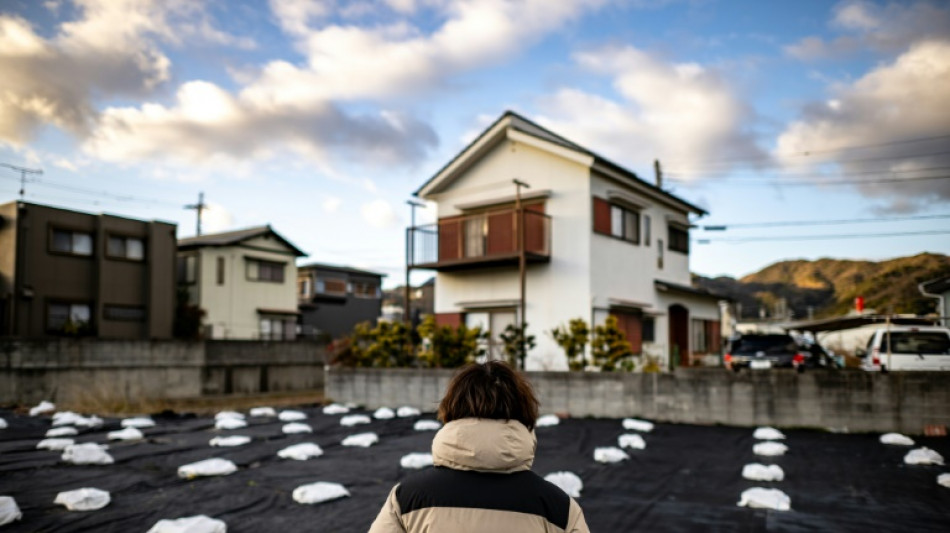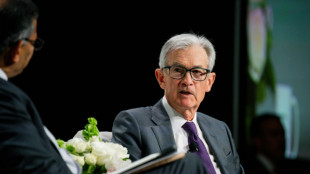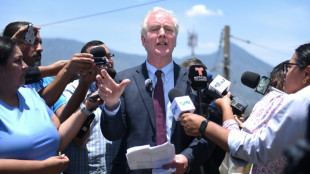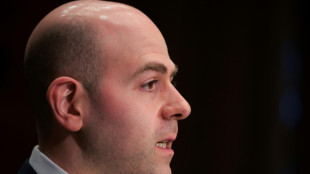
-
 Australia's Mary Fowler set for long lay-off after ACL injury
Australia's Mary Fowler set for long lay-off after ACL injury
-
Rubio to meet French leaders for talks on Ukraine

-
 Webb spots strongest 'hints' yet of life on distant planet
Webb spots strongest 'hints' yet of life on distant planet
-
Arteta's Arsenal come of age with Madrid masterclass

-
 None spared in Nigeria gun, machete massacre: survivors
None spared in Nigeria gun, machete massacre: survivors
-
'No problem' if Real Madrid replace me: Ancelotti

-
 Inter dreaming of treble glory after reaching Champions League semis
Inter dreaming of treble glory after reaching Champions League semis
-
'No limits' for treble-hunting Inter, says Pavard

-
 Inter off Bayern to reach Champions League last four
Inter off Bayern to reach Champions League last four
-
Rice 'knew' Arsenal would dethrone Real Madrid

-
 US stocks fall with dollar as Powell warns on tariffs
US stocks fall with dollar as Powell warns on tariffs
-
Arsenal oust holders Real Madrid to reach Champions League semis

-
 Arsenal defeat Real Madrid to reach Champions League semis
Arsenal defeat Real Madrid to reach Champions League semis
-
AMD says US rule on chips to China could cost it $800 mn

-
 Inter hold off Bayern to reach Champions League last four
Inter hold off Bayern to reach Champions League last four
-
El Salvador rejects US senator's plea to free wrongly deported migrant

-
 Newcastle thrash Crystal Palace to go third in Premier League
Newcastle thrash Crystal Palace to go third in Premier League
-
Zuckerberg denies Meta bought rivals to conquer them

-
 Starc stars as Delhi beat Rajasthan in Super Over
Starc stars as Delhi beat Rajasthan in Super Over
-
Weinstein asks to sleep in hospital, citing prison 'mistreatment'

-
 Amorim asks McIlroy to bring Masters magic to Man Utd
Amorim asks McIlroy to bring Masters magic to Man Utd
-
Ruud keeps Barcelona Open defence on course

-
 Trump tariffs could put US Fed in a bind, Powell warns
Trump tariffs could put US Fed in a bind, Powell warns
-
CONCACAF chief rejects 64-team World Cup plan for 2030

-
 Putin praises Musk, compares him to Soviet space hero
Putin praises Musk, compares him to Soviet space hero
-
Son to miss Spurs' Europa League trip to Frankfurt

-
 US senator in El Salvador seeking release of wrongly deported migrant
US senator in El Salvador seeking release of wrongly deported migrant
-
Trump tariffs could put the US Fed in a bind, Powell warns

-
 US judge says 'probable cause' to hold Trump admin in contempt
US judge says 'probable cause' to hold Trump admin in contempt
-
India opposition slams graft charges against Gandhis

-
 Nate Bargatze to host Emmys: organizers
Nate Bargatze to host Emmys: organizers
-
US Fed Chair warns of 'tension' between employment, inflation goals

-
 Trump touts trade talks, China calls out tariff 'blackmail'
Trump touts trade talks, China calls out tariff 'blackmail'
-
US judge says 'probable cause' to hold govt in contempt over deportations

-
 US eliminates unit countering foreign disinformation
US eliminates unit countering foreign disinformation
-
Germany sees 'worrying' record dry spell in early 2025

-
 Israel says 30 percent of Gaza turned into buffer zone
Israel says 30 percent of Gaza turned into buffer zone
-
TikTok tests letting users add informative 'Footnotes'

-
 Global uncertainty will 'certainly' hit growth: World Bank president
Global uncertainty will 'certainly' hit growth: World Bank president
-
EU lists seven 'safe' countries of origin, tightening asylum rules

-
 Chelsea fans must 'trust' the process despite blip, says Maresca
Chelsea fans must 'trust' the process despite blip, says Maresca
-
Rebel rival government in Sudan 'not the answer': UK

-
 Prague zoo breeds near-extinct Brazilian mergansers
Prague zoo breeds near-extinct Brazilian mergansers
-
Macron to meet Rubio, Witkoff amid transatlantic tensions

-
 WTO chief says 'very concerned' as tariffs cut into global trade
WTO chief says 'very concerned' as tariffs cut into global trade
-
Sports bodies have 'no excuses' on trans rules after court ruling: campaigners

-
 Zverev joins Shelton in Munich ATP quarters
Zverev joins Shelton in Munich ATP quarters
-
The Trump adviser who wants to rewrite the global financial system

-
 US senator travels to El Salvador over wrongly deported migrant
US senator travels to El Salvador over wrongly deported migrant
-
UN watchdog chief says Iran 'not far' from nuclear bomb


Family fights for death-row retrial under Japan's 'snail-paced' system
Since his teenage years, Koji Hayashi has dreaded one thing: his stubborn, once-vivacious mother being hanged for murder after failing to win her long campaign for a retrial.
Left almost unchanged for a century, Japan's current retrial system is often labelled the "Unopenable Door" because the chances of being granted a legal do-over are so slim.
But hopes have grown of a change since a court last year overturned the wrongful conviction of the world's longest-serving death row prisoner Iwao Hakamada, whose case took 42 years to be reopened.
The government is asking legal experts to study the system, and some hope they will recommend revising the arduous retrial process to better safeguard the interests of convicts like Hakamada.
Masumi Hayashi, 63, is notorious in Japan for a crime she swears she didn't commit -- killing four people by putting arsenic into a pot of curry at a summer festival in 1998.
Koji isn't entirely convinced his mother is innocent, but "I think there's a good chance", he told AFP.
"All I want is the truth, and a retrial is the only way to get it," the 37-year-old truck driver said.
Since the Supreme Court upheld her death sentence in 2009 Masumi has applied for retrial several times, with her latest bid seeking to discredit a forensic analysis.
"The thought of a noose around my mum's neck, even as she insists on her innocence, terrifies me so much my hands shake," Koji said at his minimal-style apartment in western Japan's Wakayama region.
"But when I saw how long it took Hakamada to be exonerated, I accepted this is the kind of fight I'm up against. I will bury my emotions, and deal with it."
- 'Lagging behind' -
Wakayama's prosecutor's office declined to discuss Masumi's case when contacted by AFP.
Evidence against her is mostly circumstantial, and the motive remains unexplained for what the Supreme Court described as indiscriminate killings.
Masumi has however admitted to a history of conspiring with her husband to use arsenic to orchestrate insurance fraud -- testament, judges said, to her "deep-seated criminality".
Koji, whose first name is a pseudonym, sometimes imagines what life could have been: "getting married, having kids and building a house, you know, ordinary happiness."
In reality, being Masumi's son has entailed a lifetime of discrimination, from an annulled engagement to online messages wishing him dead and his older sister's suicide four years ago.
Only five retrials have been granted in Japan's post-war history for death row prisoners, all resulting in exoneration.
The latest was for 89-year-old Hakamada, who in September was acquitted of a quadruple 1966 murder, following decades in solitary confinement.
Hakamada's lawyers first sought his retrial in 1981 but a back-and-forth of legal appeals meant it did not materialise until 2023.
Japan is "significantly lagging behind the world" in ensuring swift retrials, said former judge Hiroaki Murayama -- who himself ordered Hakamada's landmark retrial.
Just one percent of around 1,150 retrial applications from all convicts, processed in Japan between 2017 and 2021, won approval.
- 99.9 percent conviction rate -
Judges and defence lawyers are denied access to a trove of prosecutor-held evidence, including material that could potentially prove someone innocent, Murayama told AFP.
And legal loopholes mean retrial applications can be ignored with impunity for years in a system "too snail-paced" to protect against judicial errors, he added.
Steps taken in other countries against wrongful convictions include banning prosecutors from appealing retrial orders and weakening their monopoly on evidence.
But Japan's 99.9 percent conviction rate -- conveying rock-solid trust to prosecutors -- leaves little room for guilty verdicts to be questioned.
Prosecutors say easier access to their evidence raises privacy concerns, and Tokyo prosecutor Kaori Miyazaki warned last year against giving the impression "that trials can be casually redone even after rulings are finalised".
"That would cause a major loss of trust in our criminal judiciary," she told a justice ministry panel.
Former prisoner Kazuo Ishikawa died this month aged 86 after spending over 30 years seeking a retrial for the 1963 murder of a schoolgirl.
That prospect looms over the Hayashi family, including Masumi's 79-year-old husband, Kenji.
"It's easier for a camel to go through the eye of a needle" but giving up their joint retrial fight "would crush my son", he said.
"I'm nearly 80 though -– my body is reaching its limit," said Kenji, who uses a wheelchair after a brain haemorrhage.
Koji, the son, believes Japan is better off without capital punishment.
But if a retrial found Masumi guilty, he would eventually "have to accept" that she must be executed.
Meanwhile Masumi lives in a solitary cell only three tatami mats wide.
"You are my treasure," she told her son in a recent letter.
"Thanks to you, I have survived my 26 years of life here," she wrote. "Your smile is the best."
U.Maertens--VB

